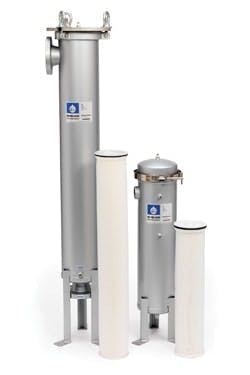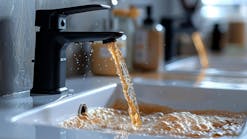The availability of commercial-grade high-flow filters and housing systems offers benefits for manufacturers across all industries, particularly for reverse osmosis (RO) prefiltration or filtering water and wastewater. These types of large, pleated filters offer a large filtration area, lowering cost and frequency of filter replacements and reducing environmental impact.
High-flow filter cartridges allow for finer filtration and can be used with highly corrosive fluids such as seawater or chemicals. The cartridges can be installed in larger, one-coated carbon or single stainless steel housings that feature smooth interiors conducive to different types of coatings. This means the filters can handle a wider array of manufacturing needs, including filtration of liquids with high saline content, certain chemicals, petrochemicals, plating solutions, pharmaceuticals and more. It also benefits municipalities that must filter or prefilter brackish water or work with aggressive water containing corrosive contaminants or high total dissolved solids (TDS).
One high-flow cartridge can do the job of many smaller cartridges with less square footage of filtration media. Large, single-cartridge pleated high-flow filters can put an estimated 100 sq ft of surface area can to use, exceeding the 4 to 6 sq ft offered in many standard filter configurations. Although per-unit costs may be higher, these filters offer greater dirt-holding capacity and require fewer changeouts, so long-term costs are reduced. Additionally, equipment downtime is reduced when larger cartridges are used, as are associated labor costs.
A large, high-quality, high-flow filter is compatible with a broad spectrum of fluids and permits flow rates of up to 500 gal per minute in a single cartridge. Pleats made from melt-blown Food & Drug Administration-compliant polypropylene microfiber (or other synthetic fiber) can provide high particle removal efficiency with broad chemical compatibility.
High-flow filter cartridges require a larger single housing, which replaces the multiple housings or large housings necessary for multiple cartridges. This frees up space on the manufacturing floor and reduces the amount of equipment needed in the filtration process. Given their size and design, single-housing cartridges can be easily worked into new system layouts or upgraded system redesigns.
Filtration Applications
These types of housings are ideal for high-temperature, high-pressure applications, and are typically multi-purpose and interchangeable to accommodate high-flow filters or bags. This capability gives manufacturers the flexibility to swiftly modify filtration types as the season or application demands. It also allows them to maximize their investment by allowing equipment to respond quickly and simply to changing needs. While these housings should offer standard features such as quick cartridge changeouts and multiple gasket options, they also should be able to be customized to meet manufacturers’ standards so they work more effectively.
Because large pleated cartridges can replace smaller cartridges, less waste is generated, both in the manufacturing of cartridges that require plastic and the amount of waste produced by changing out filters. In addition, many high-flow filters can be washed and reused, further increasing the lifespan of each product. This reduces the impact on the environment, particularly in landfills.
High-flow filter housings may carry American Society of Mechanical Engineers (ASME) certification, demonstrating an adherence to globally accepted engineering standards as well as integrity, quality and durability in production and performance. As more countries around the world demand certifications and standard requirements, the ASME code is increasingly important for factories, water filtration plants and other end users.
Today, mass-market high-flow filters are becoming increasingly available. For example, Shelco Filters has developed an affordable, off-the-shelf high-flow filter and housing option after detecting increased needs for finer filtration and for filtration of highly corrosive liquids (seawater and chemicals) and protection of the metals used in other parts of the filtration process. The company used 3-D printing to create a prototype of the high-flow filter and housing, which was tested and then adapted to a more standardized format. This is the first time the company tapped into the cost-effective design options offered by 3-D printing, which proved valuable in bringing high-flow filters quickly and efficiently to the marketplace. The 3-D modeling, along with designs based on the company’s expertise in developing customized high-flow filters for specific customers and manufacturing applications, helped make these filters available to a wider audience.
With cost savings, floor space savings, environmental savings and increased quality and versatility, high-flow filtration can benefit all manufacturers. For those facing high-TDS fluids or aggressive water, high-flow filtration is an option that protects equipment and meets quality standards. As these commercial and industrial high-flow solutions become more widely available, especially for water and chemical filtration, manufacturers and municipalities have a powerful tool at their disposal.
Download: Here



